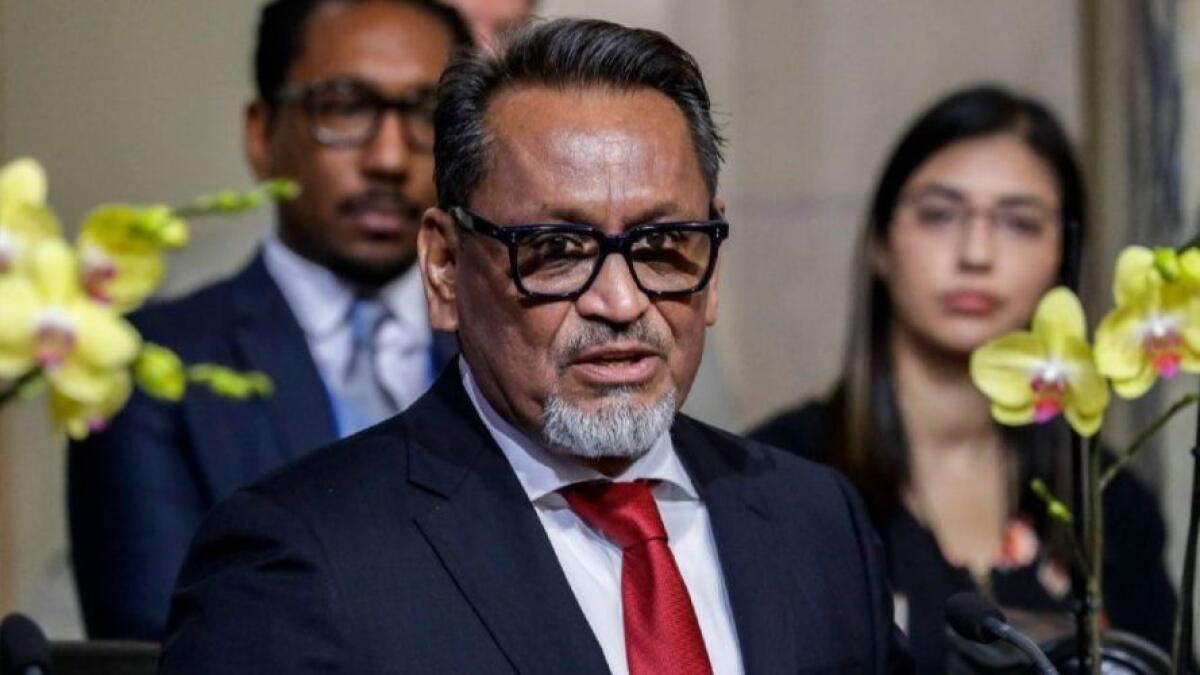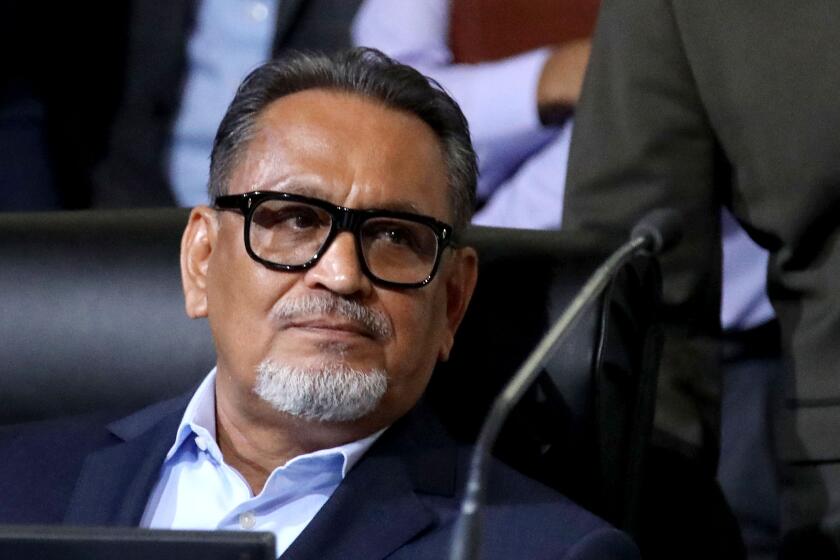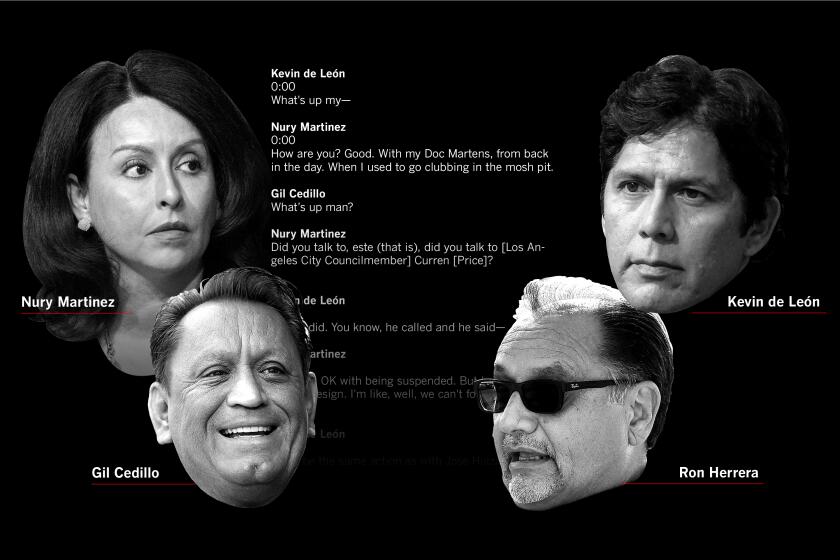‘Why I Did Not Resign’: Gil Cedillo suggests he’s a victim of ‘cancel culture’

- Share via
Just hours after his City Council term ended, Gil Cedillo released a three-page letter Monday titled “Why I Did Not Resign,” in which he shares his thoughts about the racist conversation and leak scandal that tarred his final months in office.
Cedillo disappeared from the public stage in mid-October, shortly after The Times reported on the inflammatory backroom conversation, with his spokesperson repeatedly telling reporters that the veteran politician was “at a place of reflection.”
Cedillo was one of four high-profile participants in the secretly recorded October 2021 conversation, which centered on Los Angeles’ once-a-decade redistricting process and included racist and derogatory comments about a rainbow coalition of groups.
Former Council President Nury Martinez and former L.A. County Federation of Labor President Ron Herrera quit shortly after the tape was disclosed. A fourth participant, Councilmember Kevin de León, remains in office.
The 1,143-word document is the first time Cedillo has talked extensively about the incident. He apologized in mid-October and told The Times that he didn’t make racist remarks or mock his colleagues during the conversation.
Councilman Gil Cedillo faces widespread calls to resign and criticism for not speaking up in the leaked racist conversation that has left allies feeling broken-hearted and opponents emboldened.
His spokesperson, Conrado TerrazasCross, did not respond when asked why Cedillo chose to wait until after his term was over before releasing the letter.
The letter reiterates Cedillo’s regret over not speaking up during the conversation, but suggests that he and his Latino colleagues were held to a different standard than other politicians and describes his “critics’ warped zealotry” as “cancel culture” and a “modern version of McCarthyism.”
“I publicly apologized for not cutting off my colleagues when their comments crossed a line,” Cedillo writes. “But to resign for staying silent, with no look at who said what in that room, and ignoring the totality of my work and history? That is unacceptable.”
Cedillo argues that while the conversation “crossed a line at several points,” ultimately he and his colleagues were just doing their jobs and working to ensure that Latinos were fairly represented in the redistricting process. Latinos make up about half of the city’s population, but at the time of the conversation held just four of 15 council seats.
Former Councilmember Gil Cedillo’s “Why I Did Not Resign” letter.
Discussion of this topic “led to assessing which Council members might support expanded Latino representation and who might see that as a step back for other communities, particularly districts represented by African Americans,” Cedillo writes.
Cedillo argues that their task was particularly difficult because of former President Trump’s attempt to exclude millions of immigrants in the country illegally from the 2020 census, writing: “My former council district ‘lost’ untold thousands of residents, and I have yet to see the media outrage for that crime against our Latino communities.”
Cedillo also writes extensively about how Black and Latino interests have both figured into his personal history, citing his leadership of the Service Employees International Union Local 660 at a time when it “had more African American members than any other union in L.A.” and his support of Jesse Jackson and Barack Obama as a Democratic Party convention delegate.
He also notes that he has “had African American friends and mentors my entire life, from sports and school to politics.”
He argues that the way the media covered the leak scandal “isn’t how the media covers other racially insensitive conversations,” comparing the October 2021 conversation — which included racist comments about a council member’s young Black son — with now-Mayor Karen Bass making “some regrettable comments in a debate.”
“Bass apologized, and the public — myself included — accepted her explanation. ... We clearly are not being held to the same standards,” Cedillo writes. That section also referenced “a history of outlandish remarks about Latinos and Asians” made by San Francisco Mayor London Breed who, like Bass, is a Black woman.
A bombshell recording has thrown L.A. politics into chaos. What was really being discussed? L.A. Times reporters and columnists pick it apart, line by line.
TerrazasCross did not respond when asked whether that line in the letter was a reference to Bass suggesting that Rick Caruso, her opponent in the mayoral race, paid for the endorsement of a local Latino Democratic club — comments for which she later apologized.
A Bass spokesperson declined to comment on Cedillo’s comparison.
Toward the end of his letter, Cedillo turns toward a broader discussion of cancel culture, referencing a recent controversy that led to the singer Lizzo using — then removing — the word “spaz” from a song.
“When told that the term was offensive to disabled people, she re-recorded the song with new lyrics. Nothing, however, satisfied her critics,” Cedillo writes. (The Washington Post reported that Lizzo’s decision to rerelease the song “was celebrated online.”)
Cedillo closes by saying: “I will never turn my back on the communities I have represented or the people for whom I have fought. This modern version of McCarthyism is a danger to democracy, not a defense. It’s ‘cancel culture’ at its worst, and this kid from Boyle Heights never resigned.”
More to Read
Sign up for Essential California
The most important California stories and recommendations in your inbox every morning.
You may occasionally receive promotional content from the Los Angeles Times.













